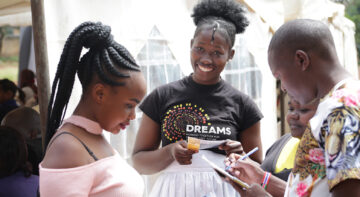Blogs

On 24-25 June 2019 AFIDEP partnered with Youth in Action (YACT), an initiative of AMREF Health Africa, to host a write-shop that developed strategies for youth-led interventions towards ending teen pregnancies. The result was a one-year action plan for a flagship campaign dubbed StepUP the Fight to End Teenage Pregnancy intended to accelerate multi-sectoral action to address the adolescent pregnancy crisis in Kenya.
Active participation of youth in the development of policies and programmes concerned with issues that affect them ensures ownership and relevance, and in this context would well capture and address the needs of teenagers at risk of getting pregnant.
The write shop sessions were organised around five thematic areas: decoding the teen lingo; policy and legal interventions; political traction and action; digital innovation and solutions; and access to effective service delivery. Participants included youth from different parts of the country, adolescents, youth sexual and reproductive health (AYSRH) experts, policy makers, champions and development partners. Discussions centered on the drivers of teenage pregnancies and explored ways to build on existing efforts and best practices while exploring innovations that work.
Poverty and scarce economic opportunities
Led by Hon Caroline Wangamati, First Lady, Bungoma County, First Ladies from Narok, Kakamega, Baringo, and Tharaka Nithi counties said that poverty and scarce economic opportunities were key drivers of teen pregnancies. Mrs. Wangamati narrated a scenario where teenage girls in Bungoma County often exchange sexual favours for sanitary towels, food, gifts or pocket money. Lack of basic needs and limited access to career and economic opportunities expose teenage girls to exploitation by men in the township. This scenario is repeated across the country, especially in low development areas.
The government needs to invest in the youth and especially in young girls, by improving access to education and economic opportunities. This would significantly decrease their vulnerability to high-risk sexual activity leading to early pregnancy.
Harmful cultural and traditional practices
Cultural and traditional practices such as forced and early marriages contribute greatly to the prevalence of teenage pregnancies. In some communities in the North Eastern and Coast regions of Kenya, girls are often encouraged to start bearing children as soon as they are of age, and have almost no control over their fertility. As a participant from one of these communities pointed out, early marriages often provide economic gain to families and serve as a rite of passage. These actions are usually protected by kinship ties and complicit authority figures, making it hard to curb these practices. Besides these practices being a human rights violation, they pose serious health risks and limit a girls potential.
Discussions on harmful cultural practices proposed introducing interventions that would enhance community awareness about the negative impact of practices like child marriage, and female genital mutilation. Also, there is need to streamline policies and to ensure that law enforcement prosecutes perpetrators of activities that lead to teen pregnancies.
The need for age-appropriate sexuality education
Talking about sex and sexuality is often considered either taboo or a controversial subject in many homes and communities. Emphasising the need to have age-appropriate conversations on sexuality, AMREF’s Chief Program Officer, Mette Kinoti said that it was important to talk about sexuality in a language that young people identify with. This intervention requires sustained policy action and awareness that promotes discussions and sharing of knowledge in different settings including at home, school, or at places of religious worship.
Support for teen mothers and their children
Teenage mothers and their children experience unique challenges. Policies that protect the right of the girl to go back to school after pregnancy should be enforced. Having been born to a teenage mom who was 17 years old Nelson recounts how tough it has been for him. “My mother died when I was only two years old, leaving me in the hands of my aged grandmother. I had no adequate parental care, there were financial constraints, emotional problems, discrimination and hatred from immediate family members and community,” explained Nelson. He attempted suicide on multiple occasions. Nelson’s experience highlights the need to promote positive parenting among young mothers, and for relevant stakeholders to invest in programmes that support social and emotional support for teen mothers and their children.
Teenage pregnancy is a development issue
Teen pregnancies negatively impact development efforts. Adolescent mothers often have to drop out of school, have limited economic opportunities, early child-birth health-related problems, and social stigma. All these factors set in motion a cycle of poverty for the girl, for families and society, and even the country’s economy.
Teenage pregnancy, its drivers and effects are a complex issue that demand for a holistic approach. Ending teenage pregnancies cannot be delivered overnight but rather through a sustained multisectoral approach that not only focuses on adolescent behavior change but also seeks to address underlying economic, social and cultural factors that intensify the prevalence of teen pregnancies.
Related Posts





